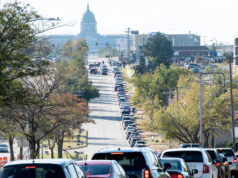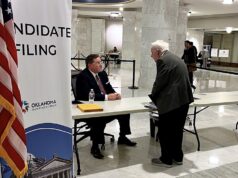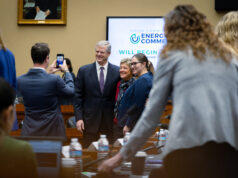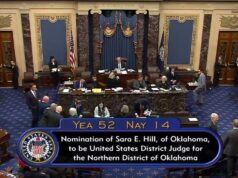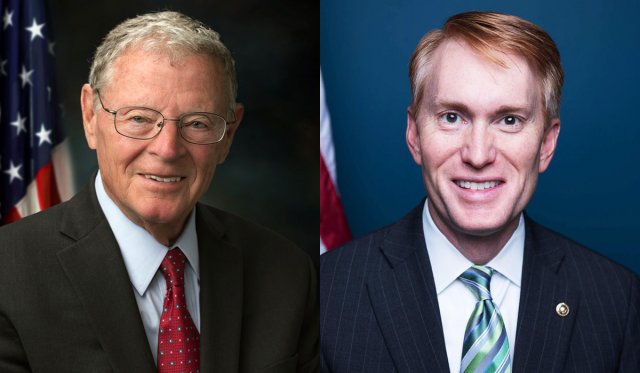
WASHINGTON — The U.S. Senate Republican Caucus will vote Wednesday on whether to bring back earmarks, a controversial process that allows lawmakers to request funding for local projects in congressional budget bills.
Sen. Jim Inhofe (R-OK), a prominent user of earmarks prior to the 2010 Senate GOP ban, would welcome their return, as it would put more spending power in the hands of Congress rather than the Biden administration.
This story was reported by Gaylord News, a Washington reporting project of the Gaylord College of Journalism and Mass Communication at the University of Oklahoma.
“What [Congress doesn’t] do in terms of our elected duties, it automatically goes back to the [Biden] administration,” Inhofe said. “I would hate to put ourselves in a position where we can’t do things in our state of Oklahoma.”
The return of earmarks may allow President Joe Biden’s $2.2 trillion infrastructure bill to garner more Republican support, as GOP lawmakers could request funding within the bill for their local districts. Senate Democrats are largely expected to request earmarks for their districts.
Sen. James Lankford (R-OK), the state’s junior senator, doesn’t share Inhofe’s view.
“Earmarks was one of the practices with Congress that seems like such a good idea to say, ‘Congress has the responsibility to be able to wisely spend American taxpayer dollars,’” Lankford said. “The problem is earmarks are one of the worst of the worst ways that Congress was actually spending taxpayer dollars.”
The late Oklahoma Sen. Tom Coburn famously referred to earmarks as a “gateway drug” to overspending. As the Biden administration’s infrastructure bill is emerging, Lankford not only holds Coburn’s seat in the Senate but shares his ideology regarding earmarks.
Lankford said earmarks were often a misuse of funds and became a way to buy votes from legislators on bills they “normally wouldn’t vote for.”
House delegation split as well
House Democrats and Republicans both voted in March to bring back earmarks, implementing new transparency rules that require members of Congress to provide evidence that their local communities support their earmarks requests and that no immediate family members have any financial interest in their projects. The House rules also implement a limit of 10 earmark requests per fiscal year, among other guidelines.
Rep. Kevin Hern (R-OK1) cited Coburn and said he voted against the earmark proposal in the House GOP secret vote owing to worries of overspending by the Biden administration.
“Earmarks are reminiscent of a corrupt and foul period in congressional history. Overwhelmingly, Americans do not support earmarks,” Hern said. “As the late Sen. Tom Coburn used to say, earmarks are a gateway drug to incredible spending. I fear for how the Biden administration and Speaker (Nancy) Pelosi might use earmarks to pass their expensive agenda.”
Rep. Markwayne Mullin (R-OK2) voted in favor of allowing earmarks in hopes of using community project funding to alleviate a $300 million critical backlog need on the Tulsa Port of Catoosa in Rogers County, which is in Mullin’s district. The Port of Catoosa is the origin point of the McClellan-Kerr Navigation System, which funnels into the Mississippi River.
In 2014, Mullin helped appropriate dollars to fund the then-$60 million critical backlog need in the Water Resources Reform and Development Act of 2014, but the money was later reappropriated to fix a dam on the Ohio River. With the critical backlog now rising to $300 million after the money has continuously been directed elsewhere over the years, Mullin hopes the return of earmarks will allow him to fund that port directly.
“It’s a very valuable asset we have. It’s about a $3 million a day impact on Oklahoma’s economy,” Mullin said. “It’s a ticking time bomb. One of the locks [or] one of the channels are going to go down, and it’s going to close the economic impacts and benefits that [it] has on Oklahoma and Arkansas.”
Inhofe also endorsed earmarking funds toward the navigation system, calling it “Oklahoma’s best-kept secret.”
Reps. Tom Cole (R-OK4) and Frank Lucas (R-OK3), the only Oklahoma House members who were around prior to the earmarks ban, did not disclose how they voted on the secret ballot, but both have used earmarks in the past and spoke positively about their return.
Cole has used earmarks to fund an exit from Interstate 35 to a Chickasaw Nation casino, as well as a phased array radar at the University of Oklahoma’s weather center.
“In my view, [earmarks are] a useful tool and an appropriate tool, and I certainly never minded scrutiny on anything I ever did,” Cole said.
Lucas used earmarks to fund the Oklahoma City bombing memorial, as well as a control tower at Vance Air Force Base near Enid in 2010, which is named after Inhofe, the co-sponsor on the earmark.
“Were there abuses in the old system? Absolutely. But there are frailties in the legislative process in everything,” Lucas said.












